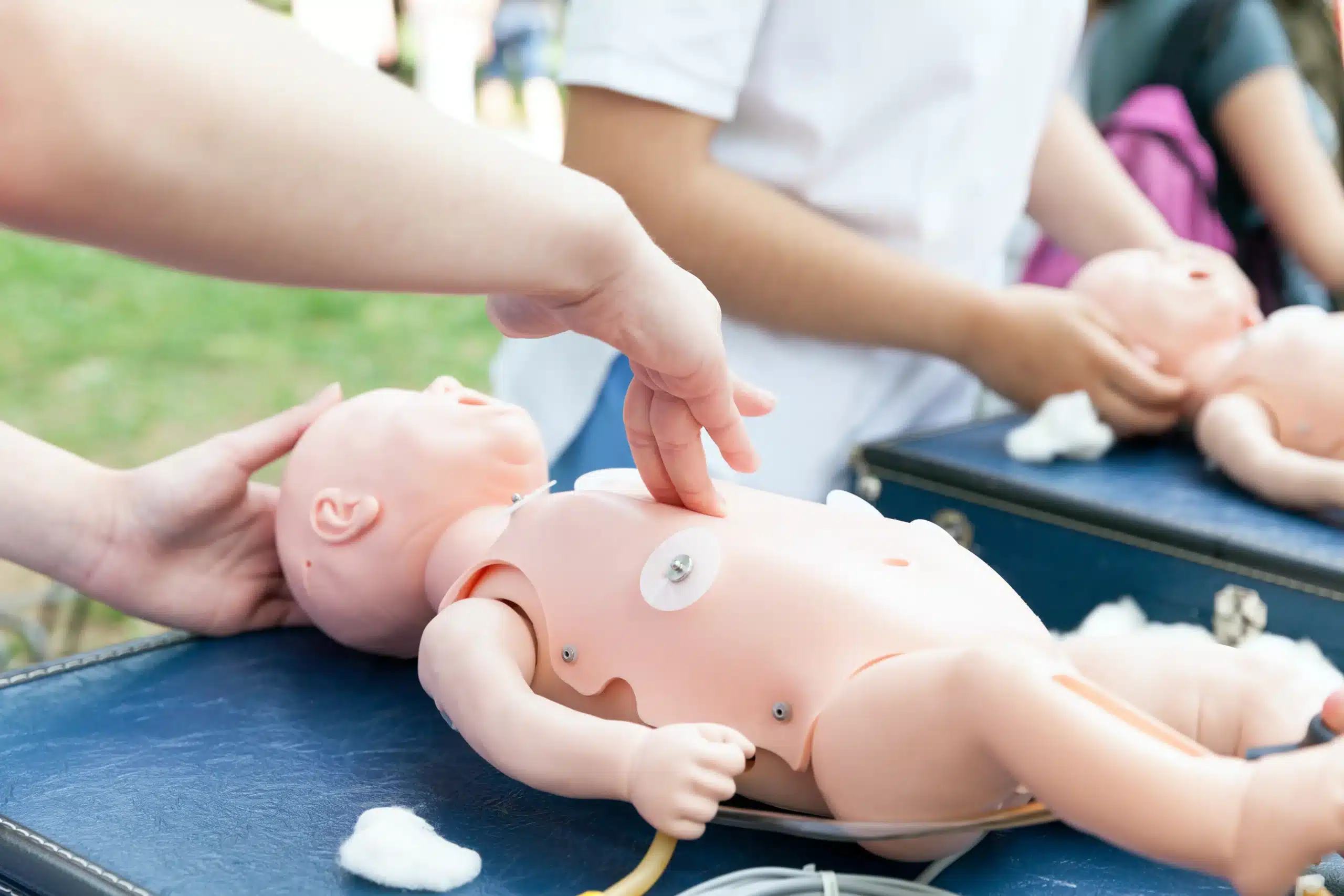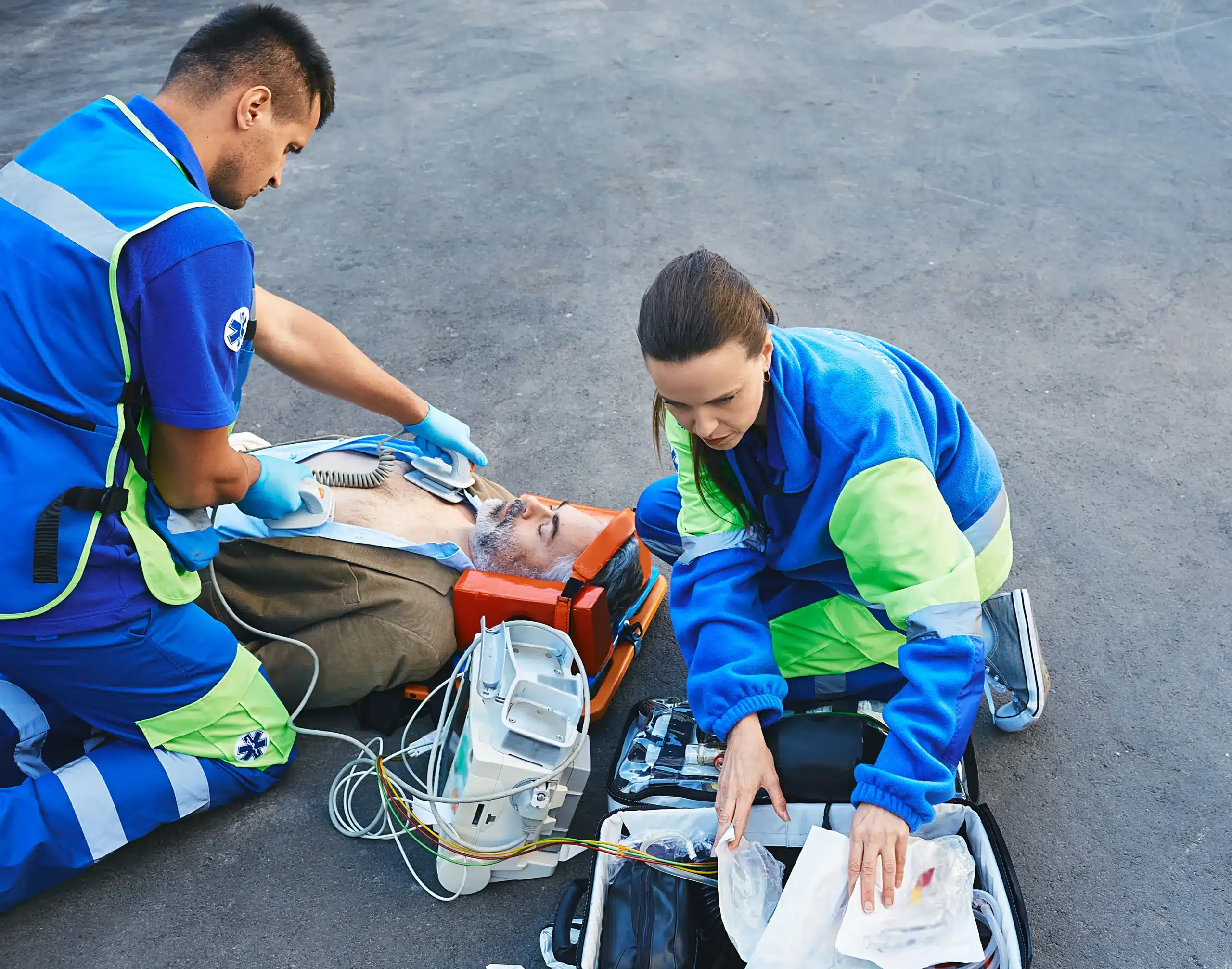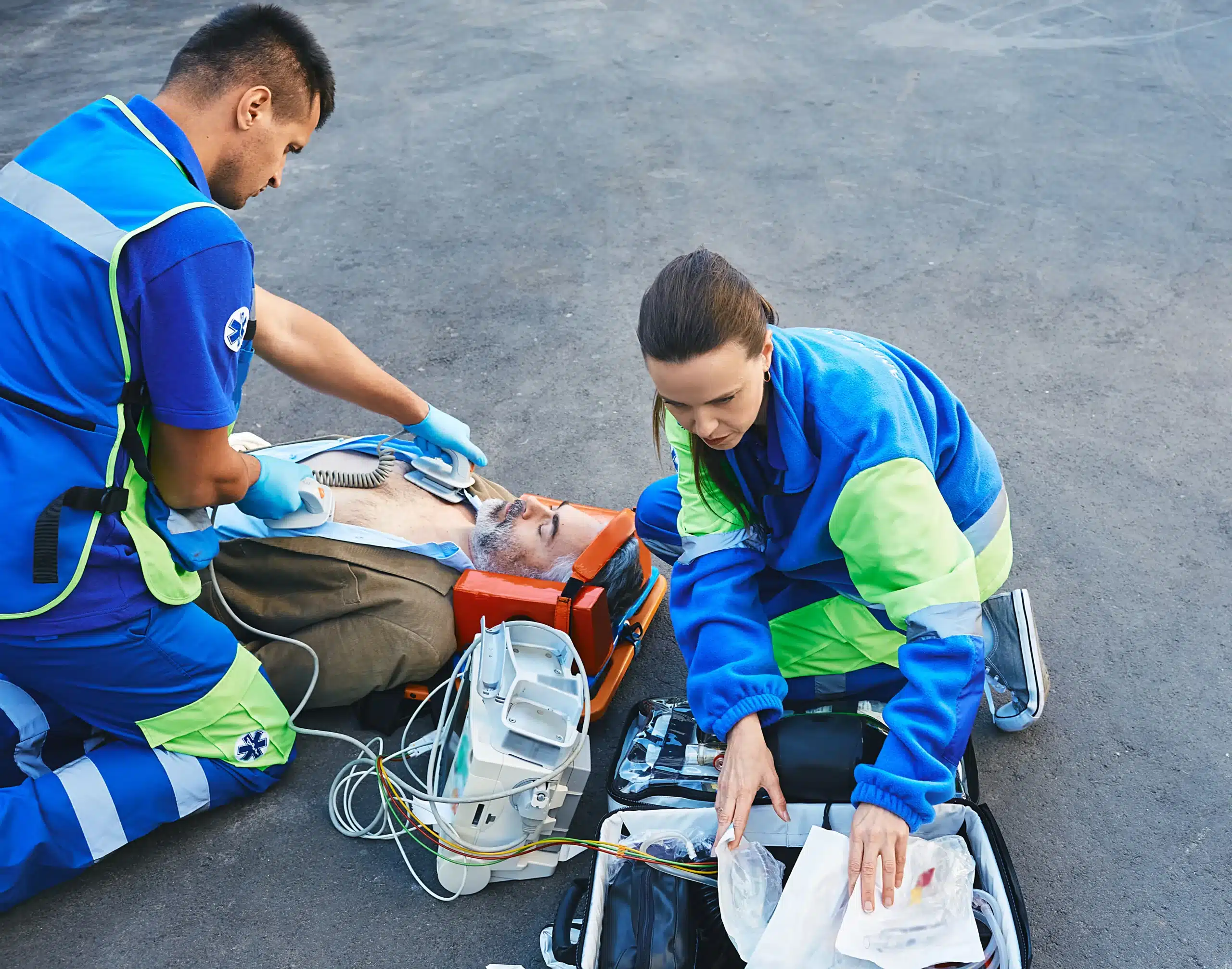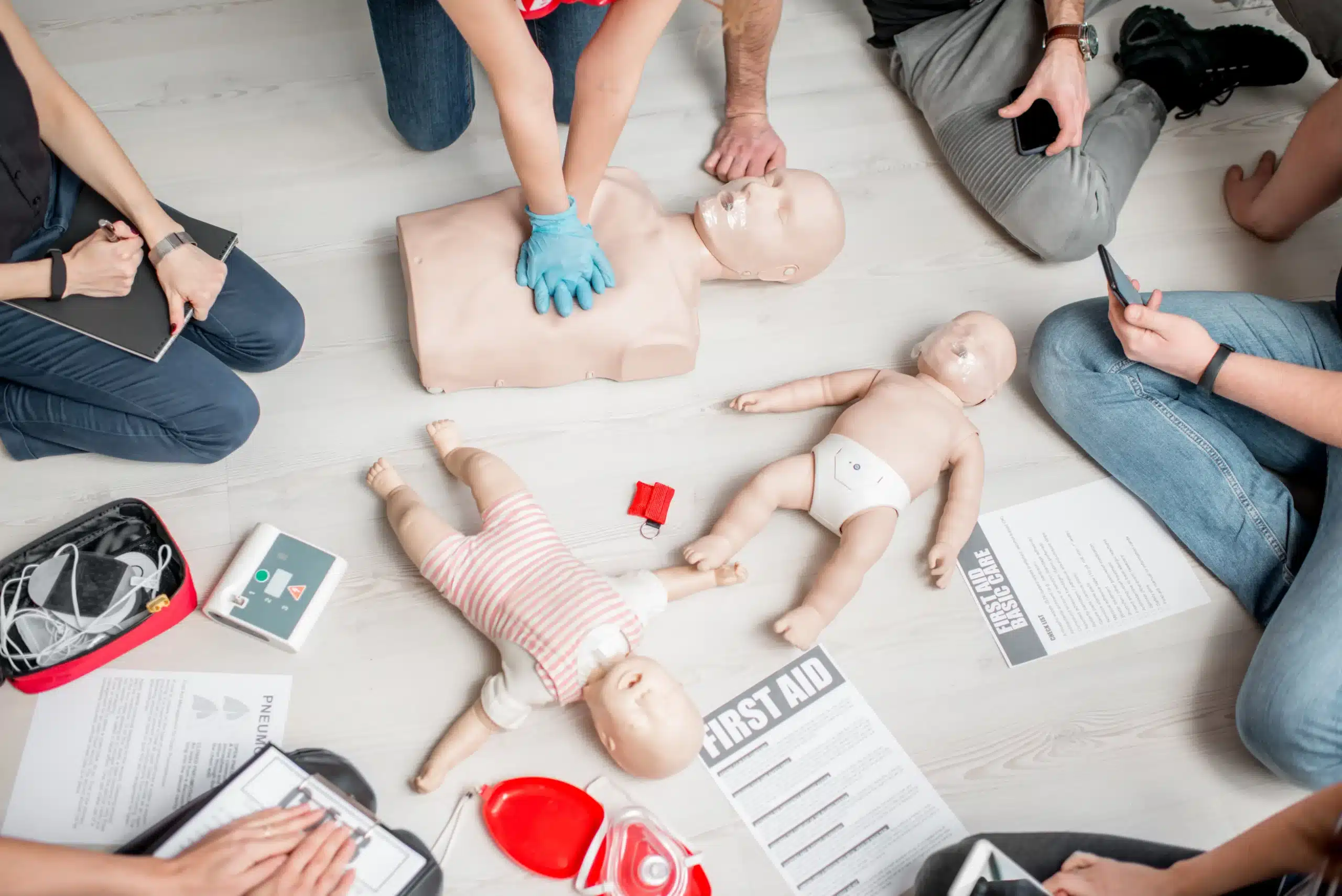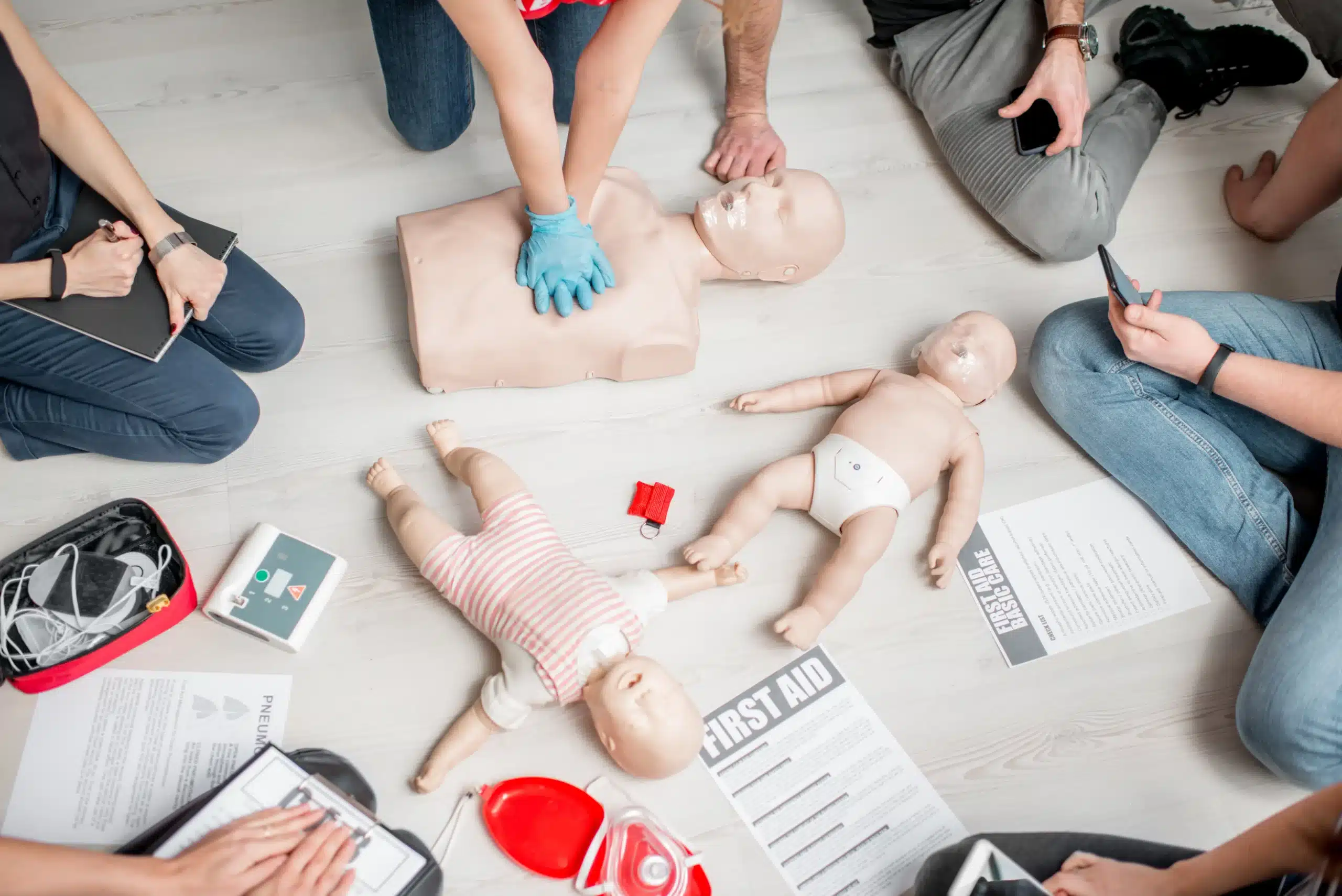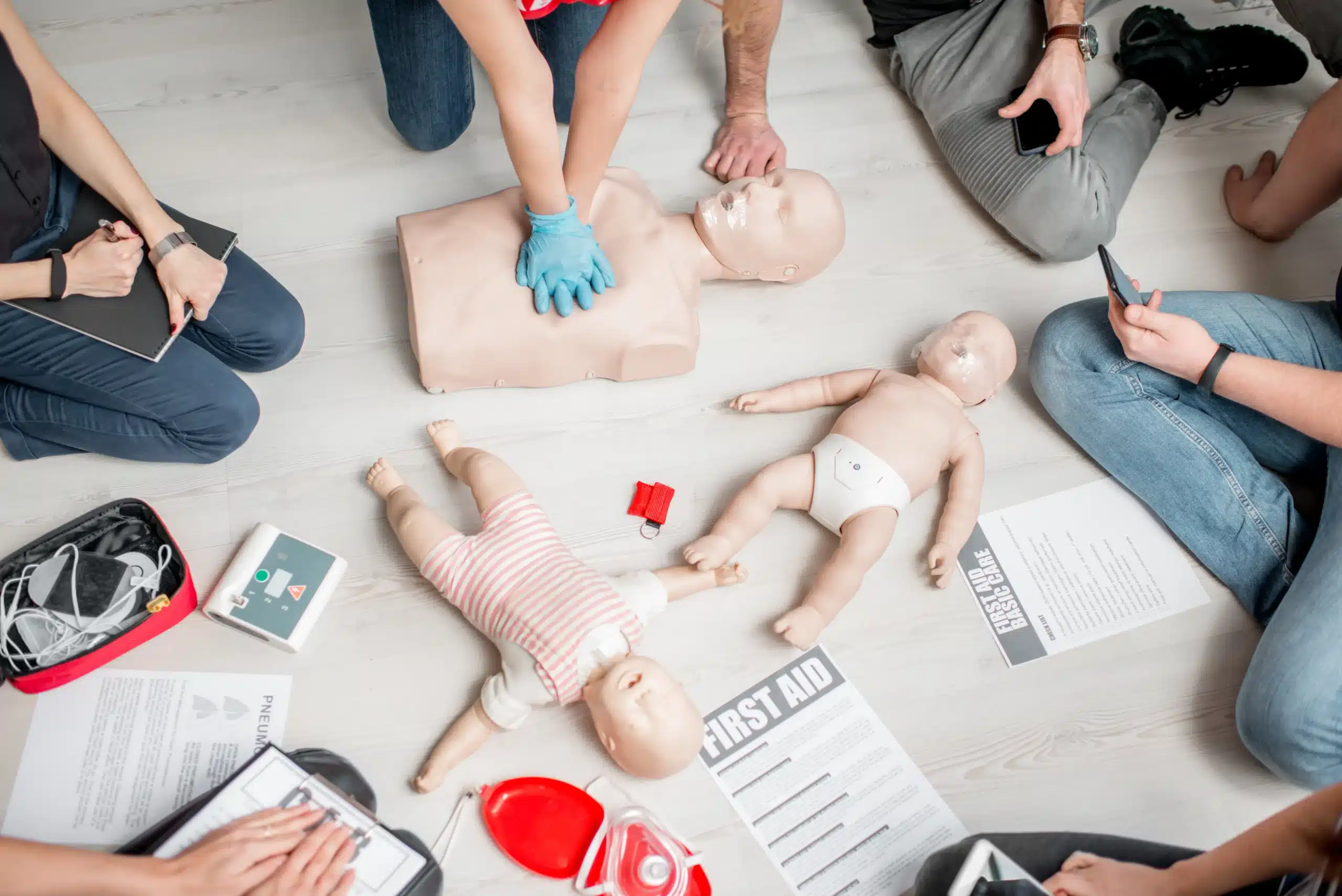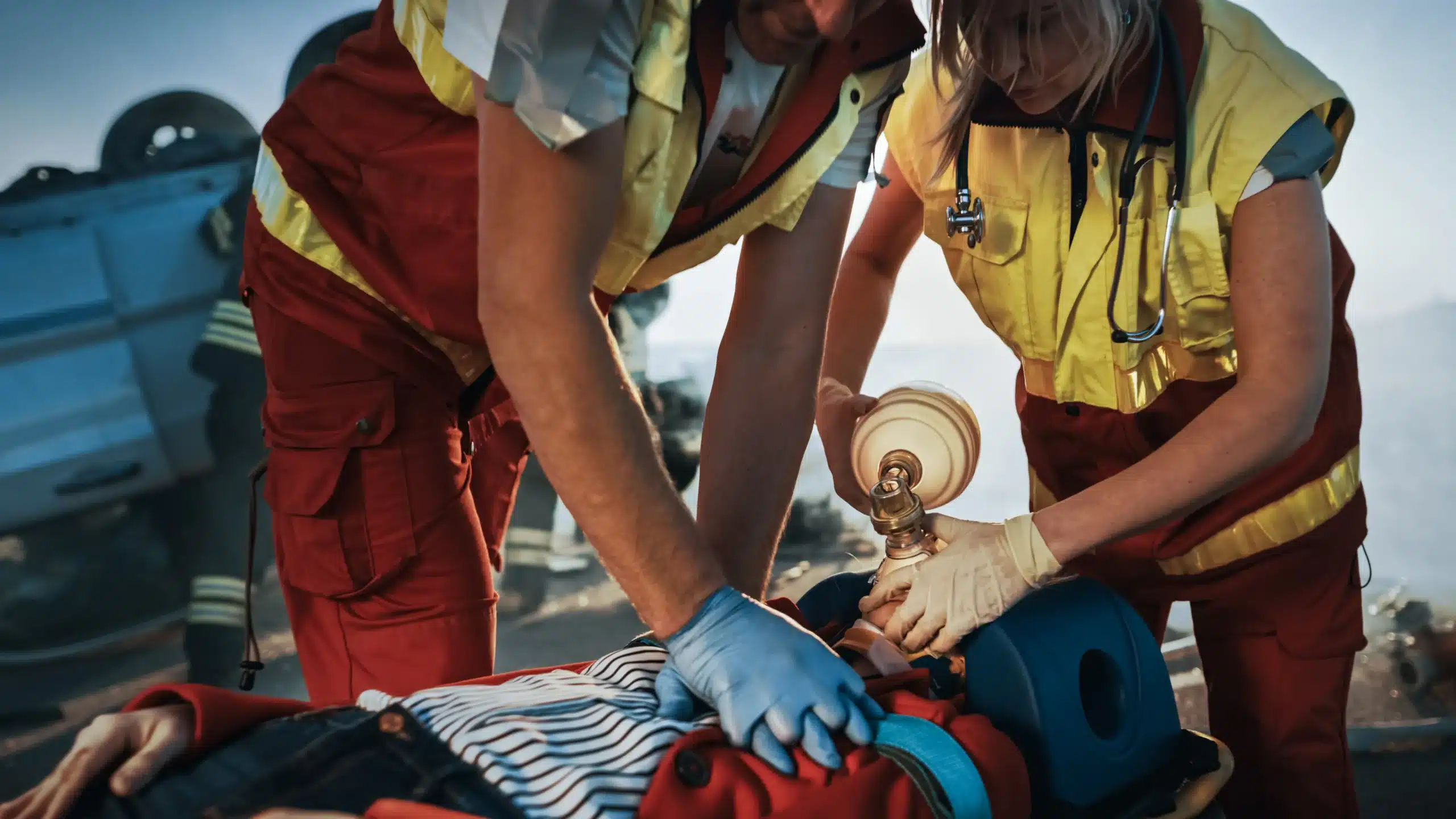Have you ever considered how you’d react in a medical emergency? Seconds can matter when someone’s life is on the line. CPR training in Concord gives you the skills to respond effectively and potentially save a life. This guide explores the importance of CPR training, the various types of CPR courses available in Concord, and how to choose the right training provider for your needs. Whether you’re a healthcare professional, a childcare provider, or simply someone who wants to be prepared for anything, this guide will help you find the perfect CPR training in Concord to suit your goals and schedule. We’ll also debunk common CPR myths and discuss the numerous benefits of becoming certified.
Key Takeaways
- CPR skills empower you to save lives: Learning CPR equips you to respond confidently during medical emergencies, increasing the chances of survival for someone experiencing cardiac arrest.
- Find the right CPR course for your needs: Explore various CPR certifications, including BLS, ACLS, PALS, and Hands-Only CPR, to find the training that aligns with your personal and professional goals. Consider factors like course content, format (online, blended, or in-person), and provider reputation.
- CPR training is accessible and affordable: Many training centers offer competitive pricing, group discounts, and flexible scheduling options to make CPR training convenient for everyone.
What is CPR Training in Concord?
CPR training equips you with the skills to respond to medical emergencies where someone’s breathing or heartbeat has stopped. Concord CPR classes cover essential life-saving techniques and provide certification recognized by organizations like the American Heart Association. Whether you’re a healthcare professional, a concerned parent, or simply want to be prepared for the unexpected, CPR training empowers you to make a difference. This training is invaluable for various professions, from healthcare providers and childcare workers to teachers, coaches, and other community members. Safety Training Seminars offers a range of CPR courses in nearby Walnut Creek, serving Concord, Pleasant Hill, and surrounding areas. We offer an extensive selection of courses, including BLS, ACLS, and EMSA Child Care Health & Safety.
What is CPR and Why Does it Matter?
CPR stands for Cardiopulmonary Resuscitation. It’s a life-saving technique used when someone’s heart stops beating or they stop breathing. CPR involves chest compressions and rescue breaths, which help circulate oxygenated blood to the brain and other vital organs. Learning CPR can literally double or triple a person’s chance of survival after cardiac arrest. Every second counts in these situations, and knowing CPR can bridge the gap until professional medical help arrives. For reliable information on CPR and common misconceptions, explore resources like this article from DarwynHealth.
CPR Training Myths
Several myths surround CPR training, often preventing people from seeking certification. One common misconception is that only healthcare professionals need to know CPR. The truth is, anyone can learn and benefit from CPR training. Another myth suggests that mouth-to-mouth resuscitation is the most important part of CPR. Current guidelines prioritize chest compressions, making CPR simpler and more accessible. Some also mistakenly believe CPR training is expensive. Many affordable options exist, making it accessible to all. Our Low Price Guarantee ensures you’re getting the best value for your training. Don’t let these myths hold you back from gaining this essential life skill. Check out our RQI classes for convenient and flexible learning options.
Benefits of CPR Certification
CPR certification offers a range of benefits, both personal and professional. Knowing CPR can give you the confidence to respond effectively in a medical emergency, potentially saving a life. It’s a valuable skill for anyone, but especially for parents, caregivers, and those working with children. CPR certification is also a requirement for many jobs, including those in healthcare, education, and childcare. Having this certification can enhance your job prospects and demonstrate your commitment to safety. Plus, knowing you have the power to help in a crisis provides invaluable peace of mind. Learn more about the advantages of CPR training and dispel any remaining concerns about getting certified.
CPR Courses in Concord
Finding the right CPR course can feel overwhelming, but it doesn’t have to be. Concord offers various options to suit different needs, from basic life support to specialized certifications. Let’s break down the most common types of CPR training available in Concord.
Basic Life Support (BLS)
BLS certification is the cornerstone for healthcare providers and anyone in a medical field. This course covers core CPR skills for adults, children, and infants, including recognizing the signs of cardiac arrest, providing chest compressions, and delivering rescue breaths. It also teaches the use of an automated external defibrillator (AED) and how to relieve choking. BLS certification is often a prerequisite for other advanced courses and is essential for many healthcare jobs. Safety Training Seminars offers BLS certification in Concord.
Advanced Cardiac Life Support (ACLS)
For healthcare professionals who manage cardiac arrest and other cardiovascular emergencies, ACLS certification goes beyond the basics of CPR. This advanced course covers a wider range of interventions, including administering medications, interpreting electrocardiograms (ECGs), and working effectively as part of a resuscitation team. ACLS training is crucial for doctors, nurses, paramedics, and other professionals providing advanced cardiac care.
Pediatric Advanced Life Support (PALS)
Specifically designed for healthcare providers who treat infants and children, PALS certification focuses on the unique needs of this younger population during medical emergencies. The course covers pediatric assessment, airway management, and resuscitation techniques. PALS certification is essential for pediatricians, pediatric nurses, emergency medical technicians, and other professionals who work with children in critical care settings.
Hands-Only CPR
Even without formal certification, learning Hands-Only CPR can empower you to make a difference in a life-or-death situation. This simplified technique focuses on continuous chest compressions at a rate of 100-120 beats per minute, eliminating the need for rescue breaths. Hands-Only CPR is recommended for untrained bystanders who witness sudden cardiac arrest in an adult. While comprehensive CPR training is always best, learning Hands-Only CPR can still significantly improve the chances of survival until professional help arrives. The American Red Cross offers resources and training for this technique.
Top Concord CPR Training Providers
Finding the right CPR training provider is crucial for receiving quality instruction and a recognized certification. Here are a few reputable options in Concord:
Safety Training Seminars
Safety Training Seminars offers various CPR courses, including BLS, ACLS, and PALS. They emphasize the importance of CPR training and address common misconceptions that can prevent people from helping during emergencies. Learning about these CPR myths is key to empowering more people to act confidently in critical situations. They serve Walnut Creek, Concord, and Pleasant Hill. Check out their BLS course for healthcare providers, their ACLS course for advanced life support training, or their EMSA Child Care Health & Safety training. They also offer RQI classes to improve rescuer quality and have a low price guarantee.
CPR Works of Charlotte
If you’re in Concord, NC, CPR Works of Charlotte provides various CPR training courses for both groups and individuals. All courses are American Heart Association-certified and valid for two years, ensuring participants receive up-to-date training that meets national standards.
CPR Training Center
Serving the Bay Area, including Concord, CPR Training Center focuses on high-quality CPR, BLS, ACLS, and PALS training. Their American Heart Association-certified courses give participants the skills and knowledge to handle real-life emergencies.
American Red Cross
The American Red Cross offers comprehensive CPR/AED training and certification throughout North Carolina, including Concord. With online, in-person, and blended learning options, their OSHA-compliant courses offer flexibility and meet workplace safety requirements.
What Happens in a CPR Class?
Getting CPR certified is easier than you might think. Here’s a look at what you can expect during a typical CPR class, from course formats to certification.
Course Length and Formats
CPR classes are designed to fit various schedules and learning styles. You’ll find options for in-person, blended learning (a mix of online and in-person instruction), and fully online courses. In-person classes, like those offered at Safety Training Seminars, provide immediate feedback and hands-on practice. Blended learning offers flexibility, allowing you to complete some coursework online before attending an in-person skills session. The length of a CPR class depends on the type of certification you’re pursuing. For example, a basic CPR certification may take a few hours, while more advanced certifications like ACLS require a longer time commitment.
Essential Skills and Techniques
In any CPR class, you’ll learn the essential skills to respond to cardiac arrest and other emergencies. This includes recognizing the signs of a heart attack, performing chest compressions, giving rescue breaths (if applicable to the course type), and using an automated external defibrillator (AED). High-quality CPR training dispels common misconceptions about CPR, ensuring you learn the most up-to-date techniques.
Hands-on Practice and Real-Life Scenarios
CPR classes aren’t just lectures. Hands-on practice is a crucial part of the learning process. You’ll work with mannequins to practice chest compressions, giving you the muscle memory and confidence to perform CPR effectively in a real emergency. Many CPR courses also incorporate real-life scenarios and simulations to help you apply your skills under pressure. Effective feedback during these practice sessions is essential for improving your technique and ensuring you’re fully prepared.
Certification: Process and Validity
Once you’ve completed the required coursework and demonstrated proficiency in the necessary skills, you’ll receive your CPR certification. Most CPR certifications are valid for two years, after which you’ll need to take a recertification course to maintain your credentials. These recertification courses are typically shorter than the initial training, focusing on refreshing your knowledge and skills.
CPR Training Costs in Concord
CPR training is an investment in lifesaving skills, and understanding the costs involved helps you plan accordingly. Several factors influence pricing, so let’s break them down.
Pricing Factors
Like most things, CPR certification class costs depend on a few key details. The type of class you take—adult-only CPR, child/infant CPR, or a comprehensive course covering all ages—will play a significant role. The class format also matters. Online courses tend to be more budget-friendly, while in-person training, offering hands-on practice with certified instructors, often comes at a higher price point. Hybrid classes, combining online learning with in-person skills sessions, usually fall somewhere in between. Location can also influence pricing, so costs in Concord might differ slightly from nearby cities like Oakland. For a clear understanding of pricing, check directly with your chosen training provider. Safety Training Seminars offers a low-price guarantee, ensuring you receive competitive rates.
Average Costs
While prices can vary, having a general idea of average costs is helpful. Based on data from similar areas like Oakland, online adult CPR/AED courses can range from around $25 to $37. In-person training for the same certification typically costs between $55 and $80. Hybrid courses often cost between $90 and $105. Child/infant CPR/AED courses follow similar pricing patterns. Remember, these are just averages, and actual costs can differ depending on the provider and specific course content. Always confirm pricing with the training center directly. You can explore pricing options for various courses offered by Safety Training Seminars on their website. For those interested in specialized certifications like Basic Life Support (BLS) or Advanced Cardiovascular Life Support (ACLS), check out these resources for more information.
Group Rates and Discounts
If you’re training a team or group, look for providers offering group discounts. Many training centers offer reduced rates for group bookings, making it a cost-effective option for workplaces, community organizations, or groups of friends. Contacting providers directly to inquire about group rates is always a good idea. This can often lead to significant savings compared to individual registrations. Safety Training Seminars can provide details on group discounts for their courses.
Post-Course Resources
The value of your CPR training extends beyond the initial certification. Choose a provider that offers ongoing support and resources. This might include access to refresher materials, updates on CPR guidelines, or continuing education opportunities. Staying current with the latest techniques and best practices is crucial for providing effective CPR in real-life situations. Think of CPR training as a continuous journey of improvement. For those working in childcare settings, staying up-to-date on specific protocols is essential, and resources like the EMSA Child Care Health & Safety course can be invaluable. Regularly refreshing your skills, especially with programs like RQI classes, can significantly enhance your preparedness and confidence in emergency situations.
Find the Right CPR Training
Choosing the right CPR training is crucial for ensuring you receive high-quality instruction and a recognized certification. Here’s what to consider when selecting a CPR training provider:
Accreditation and Recognition
Look for training centers affiliated with nationally recognized organizations like the American Heart Association (AHA). AHA-certified courses (BLS, ACLS) ensure your certification is widely accepted. This accreditation is important because CPR training is often a job requirement, especially in healthcare, childcare (EMSA Child Care Health & Safety), and other fields involving public safety. A recognized certification shows you’ve received training that meets established standards.
Instructor Qualifications
Qualified instructors are essential for effective CPR training. Instructors should have extensive experience and current knowledge of CPR techniques and emergency response protocols. Ask about the instructors’ credentials and experience to confirm their expertise in teaching these life-saving skills. Proper CPR training can truly make a difference in medical emergencies.
Flexible Scheduling
Life gets busy, so choose a training program that fits your schedule. Look for providers offering various class times and formats, including weekend and evening options. Some providers also offer blended learning, combining online modules with in-person skills sessions. This flexibility lets you complete the training at your own pace. RQI classes are a great example of flexible training that adapts to your needs.
What to Look for in a Provider
A good CPR training provider should offer more than just the basics. They should address common CPR misconceptions and give you the knowledge and confidence to handle real-life emergencies. Look for providers who emphasize hands-on practice, use realistic scenarios, and provide feedback to improve your skills. A thorough program will prepare you to respond effectively in critical situations. Check for a low price guarantee to ensure you’re getting good value.
Online and Blended Learning
Online and blended learning options create interactive and engaging learning experiences. These formats often use videos, simulations, and quizzes to reinforce learning and allow for self-paced study. Blended learning combines online modules with the hands-on practice and feedback you get during in-person skills sessions. This approach can be especially helpful for those who prefer a more flexible and interactive learning style.
Related Articles
- Debunking Common CPR Myths for Better Emergency Response
- CPR & First Aid Classes in Pleasant Hill: A Complete Guide – Walnut Creek CPR Classes
- Why CPR is Important in Healthcare
- Advanced Cardiac Life Support (ACLS) in Concord, CA – Walnut Creek CPR Classes
- BLS Courses in Concord: Find the Right Class for You – Walnut Creek CPR Classes
Frequently Asked Questions
What’s the difference between BLS and CPR?
CPR is the core life-saving technique, while BLS (Basic Life Support) builds upon CPR by adding essential skills like using an AED and relieving choking. BLS certification is geared towards healthcare providers and those in medical fields, providing a broader skillset for responding to emergencies. Think of CPR as the foundation, and BLS as the next level up.
How long is CPR certification valid, and how do I renew it?
CPR certification is typically valid for two years. To renew, you’ll need to take a recertification course. These courses are usually shorter than the initial training and focus on refreshing your skills and knowledge of the latest guidelines.
What if I’m nervous about performing CPR in a real emergency?
It’s completely normal to feel nervous about using CPR in a real-life situation. That’s why quality CPR training includes hands-on practice and realistic scenarios. This helps build muscle memory and confidence, so you can react effectively when it matters most. Remember, any attempt at CPR is better than none.
Are online CPR courses as good as in-person classes?
Both online and in-person CPR courses have their advantages. Online courses offer flexibility, while in-person classes provide immediate feedback and hands-on practice with an instructor. Blended learning, which combines online modules with in-person skills sessions, offers a good balance. The best choice depends on your learning style and schedule.
How do I choose the right CPR training provider in Concord?
Look for providers offering AHA-certified courses, experienced instructors, flexible scheduling, and a comprehensive curriculum that covers essential skills and addresses common CPR myths. Don’t hesitate to ask about their teaching methods, resources, and the type of feedback they provide. A good training provider will make you feel confident and prepared to respond to emergencies.
